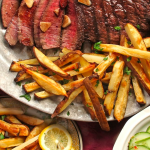Doing a carnivore diet on a budget seems like quite a challenge. Meat is expensive — there is no other way around it. However, you don’t have to break the bank on the Carnivore Diet. It is possible to do it on a budget with creative tricks and judicious shopping.
As per the Dietary Guidelines for Americans 2015 to 2020, women need around 1,600 to 2,400 calories while men need 2,000 to 3,000 calories per day. Let’s assume that on average a person needs 2,500 calories daily.
A 100g serving of ground beef contains 247 calories, including17.5 g protein, 19 g fat, and 0 g carbs. To reach the daily calorie requirement of 2,500 you would need to eat 10 servings of ground beef approximately. This would be 2.5 lbs. of ground beef daily.
At Walmart, the price of 1 lb. ground beef is $4.57. This means that for almost $10, you can easily fulfill your daily caloric requirement on the carnivore diet. $10 would barely cover the price of lunch on a traditional diet.
Layer in some of the cost-saving tactics mentioned below and you can easily follow the carnivore diet on a budget.
TABLE OF CONTENTS
Find Cheap Cuts of Meat
You can easily find cheap yet nutritious and delicious cuts. Fatty ground meats are not only cheap, but they give you energy and improve your mood as well.
Here are some examples of the cheapest cuts of four meats:
| Beef | Pork | Chicken | Lamb |
| Ground Beef | Ground Pork | Ground Chicken | Ground Lamb |
| Beef Shank | Tenderloin | Legs | Shoulder |
| Cube Steak | Spareribs | Wings | Middle Neck |
| Beef Flank | Pork Chops | Breast | Chump |
If you’re eating mainly red meat, you can select lower grades of beef to save yourself money. Lower-grade beef isn’t less safe or of lower quality. USDA’s grading system for meat is based on the tenderness, fat content, and flavor of the cut.
If you cook it right, even the chewiest piece of meat can simply melt in your mouth. Buy a slow cooker and you can make any meat tender.
You should also go for bone-in beef. It is usually cheaper than boneless meat and you can use the bones to cook bone broth and soups as well.
Buy a Whole Animal

Buying an entire animal may seem weird for a person trying to do a carnivore diet on a budget. However, if you buy a whole animal from a local farm, you’ll save a lot of money and can likely get higher-quality, grass-fed, and organic meat. You can have the animal cut into various parts and enjoy the varying nutrient profiles from each cut.
If you don’t have the freezer space to store an entire cow (like most of us, unfortunately), you can split the animal with a group of friends.
Your local butcher is more likely to give you a reasonable rate on the meat than corporate stores and supermarkets. Moreover, you can be sure about the quality and purity of the products as well. If you devise a weekly plan to buy meat in bulk, the butcher may even offer you a discounted rate.
Consume Eggs
Your carnivore diet shopping list needs to have eggs in it. Eggs are one of the cheapest yet most nutritious animal products out there. Egg contains various minerals and vitamins such as selenium, iron, zinc, B6, and B12.
Eggs contain all the nutrients required to produce an entire chicken. You can easily find cheap eggs in your local supermarkets, usually at $3.3 per dozen. Apart from eating eggs for breakfast, dinner, and lunch, you can consume them as a pre/post workout snack if you’re trying to gain muscle on the carnivore diet.
Save the Meat Drippings
Another great way of saving money is to use leftover meat drippings. You can save the fat from ground beef, strain the particles, and store it in a small jar in your fridge.
Fry your eggs and bacon in this beef tallow and save money spent on butter and ghee!
Buy Meat on Sale
It always pays off to shop around. Compare the prices of similar items in different stores and buy from the store offering you the best deal. Keep an eye out for sales. When your favorite, delicious cuts of meat are on sale, purchasing them in bulk is a good idea.
It will reduce your monthly grocery bill. You can find meat coupons on various online websites as well. Buy from the local butcher. He is more likely to give you a reasonable rate on the meat than corporate stores and supermarkets.
Moreover, you can be sure about the quality and purity of the products as well. If you devise a weekly plan to buy meat in bulk, he may even offer you a discounted rate!
Make Bone Broth
Another way of saving money on a carnivore diet is by reusing animal bones. Use the leftover bones from your meals to make a nutritious bone broth, which is not only good for your gut health but supports your bone health as well.
You can use this carnivore diet bone broth as a meal or as a nutrient-dense snack.
Store Meat Properly
If you don’t store your meat properly, it will not only increase the risk of food poisoning, but you will end up wasting a lot of money as well. As soon as you get home from the grocery store, transfer the meat to airtight containers and freeze it.
You can also place meat in plastic wraps instead of containers. Frozen ground poultry and ground meats can easily last for 3 to 4 months. Frozen chops, roasts, and steaks can last for up to a year. When you are thawing meat, it is better to first transfer it from the freezer to the refrigerator and then use it.
You can also submerge it in a bowl of water. Vacuum-seal your meat to keep it fresh for a longer duration of time.
Add Organ Meats and Canned Fish
A well-rounded carnivore diet is not all about eating filet mignon and ribeye steaks. Our ancestors ate the animal as a whole — from nose to tail. Organ meats are superfoods and are full of nutrients.
Compared to muscle meat, all the organ meats on this list are cheap — even when they’re grass-fed. Consuming organ meats is not only budget-friendly, but extremely healthy and nutritious as well. Organ meats are a great source of nutrients like riboflavin, niacin, vitamin A, zinc, iron, and protein.
You can easily buy a pound of liver for $3. If you don’t like eating organ meats on their own, you can sneak them into your burger patties or meatballs. Chop them up, freeze them, and then pop a few into any meal for a nutrient boost.
You can go for canned seafood as well. From canned tuna to salmon, herring, sardines, and anchovies, the options are endless. They are nutritional powerhouses — canned tuna fish is high in protein, magnesium, vitamin D, and vitamin B12.
Buy Grain-Fed Beef
According to the reports of the USDA agricultural marketing service, the price of organic beef was 67% higher than that of conventional beef. The reality is that grass-fed beef is not an option for everyone. Go ahead and buy the meat that you can afford, even if it is not grass-fed, pasture-raised.
By the end of the day, both grass-fed and grain-fed meat are nutrient-dense, and that’s all you need as a healthy carnivore eater.
Plan Ahead
If you don’t make a proper plan, you are setting yourself up for failure. This applies to everything in life, including following a carnivore diet. Before you go out and buy expensive meat for three meals a day for your entire week, take a step back and calculate your budget.
Figure out how much money you have, and how much you want to — and can afford to — spend on meals. Break the amount down into meats, dairy, and other animal products. then ensure that you create a menu for the entire week choosing the foods that suit your budget.









So it´s ok to eat the cheapest eggs and butter ?
Yes, the cheapest options are still better than eating processed food. Watch out for cheap butter that’s actually mixed with seed oils though. Try to get 100% grass-fed butter. If good quality butter and eggs are expensive at the store, you can try a local farmer’s market.
Thanks for your reply !!
In Germany there are only very few kinds of butter mixed with seed oils. Couldn´t find anything in regards to “grass-fed” on the packaging – it´s either organic or it´s not.
I´ll check out the farmer´s market …
Have a nice day !!
Hi Peter,
I always buy Kerrygold in Germany, because the Irish butter is actually always completely grass-fed and pasture-raised, even if that is not explicitly stated on the packaging.
In any case, that’s always better than most of the German (organic) butter you get in the supermarkets.